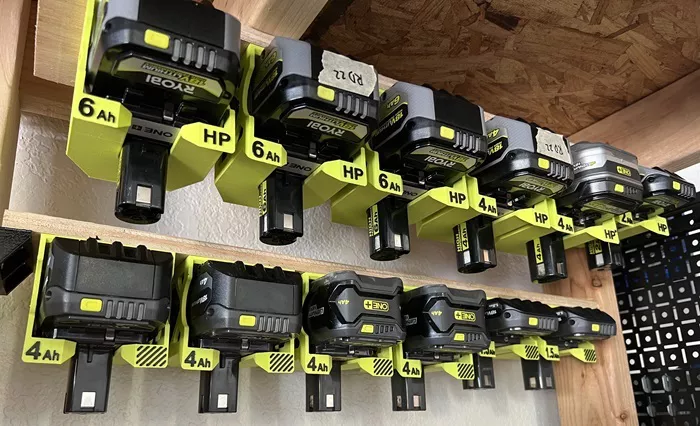Ryobi batteries are integral to the performance and reliability of Ryobi power tools, renowned for their versatility and innovation in the tool industry. Understanding the different types of Ryobi batteries, their features, and how to properly maintain them can greatly enhance the efficiency and longevity of your tools. This comprehensive guide provides detailed insights into Ryobi batteries, helping you unlock their full potential for a superior user experience.
1. Overview of Ryobi Batteries
Introduction to Ryobi
Ryobi, a leading brand in the power tool industry, is known for its commitment to quality and innovation. Their range of cordless tools relies heavily on advanced battery technology to deliver power, convenience, and efficiency.
The Role of Batteries in Power Tools
Batteries are crucial in cordless power tools, providing the energy required to operate the tool without the constraints of a cord. Ryobi’s battery technology ensures that their tools deliver consistent performance, making them a preferred choice for both DIY enthusiasts and professionals.
2. Types of Ryobi Batteries
Lithium-Ion Batteries
Lithium-ion batteries are the most common type used in Ryobi tools. They are known for their high energy density, lightweight design, and longer life compared to older battery technologies. Key advantages include:
Longer Runtime: Lithium-ion batteries provide extended use per charge.
Faster Charging: These batteries charge quickly, reducing downtime.
Low Self-Discharge Rate: They retain their charge when not in use.
Ni-Cd Batteries
Nickel-Cadmium (Ni-Cd) batteries are an older technology still used in some Ryobi tools. While they are less common now, they offer certain benefits:
Durability: Ni-Cd batteries are known for their ruggedness and can handle rough conditions.
Cost-Effective: Generally less expensive than lithium-ion batteries.
See also: Top Car Battery Brands: Reliability, Performance, And Longevity
Comparing Lithium-Ion and Ni-Cd Batteries
Performance: Lithium-ion batteries outperform Ni-Cd in terms of runtime, charging speed, and weight.
Maintenance: Ni-Cd batteries suffer from memory effect, which can reduce their effective capacity over time, while lithium-ion batteries do not have this issue.
3. Key Features of Ryobi Batteries
Battery Capacity and Voltage
Ryobi batteries come in various capacities and voltages, affecting their performance and compatibility with different tools:
Capacity: Measured in amp-hours (Ah), a higher capacity battery provides longer runtime.
Voltage: Higher voltage batteries typically offer more power. Ryobi tools use a range of voltages, from 18V to higher voltages for more demanding tasks.
Battery Technology and Innovations
Ryobi continuously innovates to improve battery technology. Features to look for include:
Fuel Gauge: Many Ryobi batteries come with a built-in fuel gauge to indicate the remaining charge.
Paddle Switch Technology: Enhances user control and safety.
Overload Protection: Prevents overheating and extends battery life.
Compatibility
Ryobi’s ONE+ system allows for interchangeable batteries across a wide range of tools. This compatibility offers convenience and reduces the need for multiple battery types.
4. How to Choose the Right Ryobi Battery
Assessing Your Needs
Choosing the right battery involves understanding your specific requirements:
Tool Type: Consider the type of tools you use and their power needs.
Frequency of Use: For frequent use, a higher capacity and faster-charging battery might be beneficial.
Budget: Higher-capacity and advanced batteries come at a premium, so balance performance with your budget.
Matching Battery to Tool
Ensure the battery you choose matches the voltage and compatibility requirements of your tool. Check the tool’s manual or manufacturer’s guidelines for recommended battery specifications.
See also: How To Clean Battery Corrosion?
5. Proper Usage and Maintenance
Charging Tips
To maximize battery life
Avoid Overcharging: Follow the manufacturer’s instructions for charging times.
Charge Before Complete Depletion: Lithium-ion batteries perform best when they are not fully discharged before recharging.
Storage Practices
Proper storage extends battery life
Store in a Cool, Dry Place: Avoid extreme temperatures and humidity.
Keep Batteries Charged: Store batteries with a partial charge to maintain their health.
Maintaining Battery Health
Regular maintenance can help prolong battery life
Clean Battery Contacts: Remove dust and debris from the battery contacts to ensure proper connection.
Avoid Physical Damage: Handle batteries with care to prevent damage.
6. Troubleshooting Common Battery Issues
Battery Not Holding a Charge
If your battery isn’t holding a charge, possible solutions include:
Check for Obstructions: Ensure the battery and tool contacts are clean and free from debris.
Replace if Necessary: Old or damaged batteries may need replacing.
Battery Overheating
Overheating can be due to:
Excessive Use: Allow the battery to cool down between uses.
Faulty Charger: Ensure your charger is functioning correctly and is compatible with your battery.
Battery Not Charging
If your battery doesn’t charge, try the following:
Inspect Charger and Connections: Check for any damage or loose connections.
Test with Another Battery: Determine if the issue is with the battery or the charger.
7. Advancements in Ryobi Battery Technology
Emerging Technologies
Ryobi continues to advance battery technology with innovations such as:
Higher Capacity Batteries: Newer models offer extended runtimes and power.
Faster Charging Technologies: Innovations to reduce charging times.
Future Trends
Expect ongoing improvements in battery efficiency, charging speed, and overall performance as Ryobi invests in research and development.
Conclusion
Ryobi batteries play a crucial role in the performance and versatility of Ryobi power tools. By understanding the different types, features, and maintenance practices, you can make informed decisions and maximize the effectiveness of your tools. Whether you’re a DIY enthusiast or a professional, unlocking the potential of Ryobi batteries will ensure reliable and efficient operation for all your projects.
Related Topics:
-
Reciprocating Saw Techniques: Pro Tips For Precision And Efficiency
-
“Truewerk: The Ultimate Blend Of Functionality And Fashion In Workwear”
-
Elevate Your Workspace: A Comprehensive Guide To Uplift Desks

